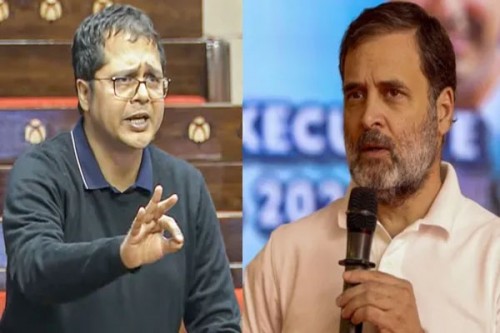From Slander to Surrender: The Apology Playbook of Opposition Parties

Trinamool Congress MP Saket Gokhale has finally issued an unconditional public apology to former diplomat Lakshmi Murdeshwar Puri, bringing a long-running defamation case to a close. His 2021 tweets had falsely questioned Puri's purchase of a property in Geneva, Switzerland. The Delhi High Court mandated the apology, which came only after repeated delays and warnings of civil detention for non-compliance. Alongside the ?50 lakh penalty for damages, the court also barred Gokhale from making any further defamatory remarks.
But this is hardly an isolated case. It marks yet another chapter in a recurring pattern where opposition leaders make provocative, often baseless allegations-only to backtrack when facts and the law catch up.
From Rahul Gandhi to Digvijaya Singh, Congress leaders have repeatedly followed the same playbook: stir outrage, trigger media buzz, and then quietly walk away once legal heat intensifies. Whether it's dragging the RSS into historical assassinations, slandering the Prime Minister, or politicising national security operations like the surgical strikes-reckless claims are often followed by courtroom apologies.
Consider Rahul Gandhi's 2014 statement blaming the RSS for Mahatma Gandhi's assassination. After a defamation case reached the Supreme Court, he was forced to clarify that his remarks were aimed at individuals "associated" with the RSS-not the organisation itself. Despite his initial bravado, Gandhi retracted his claim when put on trial.
The same pattern repeated in 2016, when Rahul Gandhi accused PM Modi of "khoon ki dalali" - politicising the Army's surgical strikes. Public backlash forced him to issue a clarification supporting the armed forces while condemning political appropriation of their actions.
Another notable instance occurred in 2019 during the Rafale deal controversy. Gandhi linked the slogan "Chowkidar Chor Hai" to a Supreme Court verdict, misleading the public into believing that the Court had endorsed corruption allegations against the Prime Minister. A criminal contempt notice by the Supreme Court led him to issue an unconditional apology, admitting the remarks were made in the heat of political campaigning.
The list doesn't end with Gandhi. Congress veterans like Mani Shankar Aiyar, Jairam Ramesh, Sanjay Singh, and Digvijaya Singh have all found themselves forced to apologise after making defamatory or unverified statements.
A classic example is Mani Shankar Aiyar, who, in 2017, sparked outrage by calling Prime Minister Narendra Modi a "neech kisam ka aadmi" (a lowly sort of man). The comment was widely condemned as elitist and casteist, prompting the Congress party to suspend him and issue a damage control apology. Aiyar later claimed his remarks were misunderstood, stating he meant "low-level behaviour," but the damage was already done.
Similarly, Jairam Ramesh, in 2019, accused NSA Ajit Doval's son, Vivek Doval, of financial impropriety based on an unverified media article. When faced with a defamation lawsuit, Ramesh eventually issued a written apology, acknowledging that he had not independently verified the claims before making them public.
In another case, Sanjay Singh falsely implicated a BJP youth member, Ankit Bhardwaj, in an attack on AAP leader Kapil Mishra in 2017. The accusation was later proven baseless, and Singh was forced to publicly apologise, admitting to a case of mistaken identity.
Even senior leader Digvijaya Singh wasn't immune to this pattern. In 2023, he posted defamatory content about RSS ideologue M.S. Golwalkar, which led to legal proceedings. A court order in 2024 directed him to issue a written apology, further reinforcing the trend. Across these incidents, a consistent theme emerges: inflammatory statements are made without evidence, narratives are pushed for political mileage, and retractions follow only after legal pressure or public backlash.
What makes these episodes stand out is Rahul Gandhi's declaration in a 2014 interview that "Gandhis don't apologise." That assertion has not aged well. With every new controversy followed by a courtroom-mandated or damage-control-driven apology, the contrast between rhetoric and reality becomes starker.
Saket Gokhale's recent public apology is a microcosm of this broader issue - a culture of unverified claims, sensationalism, and political point-scoring that ultimately falls apart under legal scrutiny. The bigger question now is: how long can this cycle of baseless allegations and belated apologies continue before it erodes all public trust?

|

|

